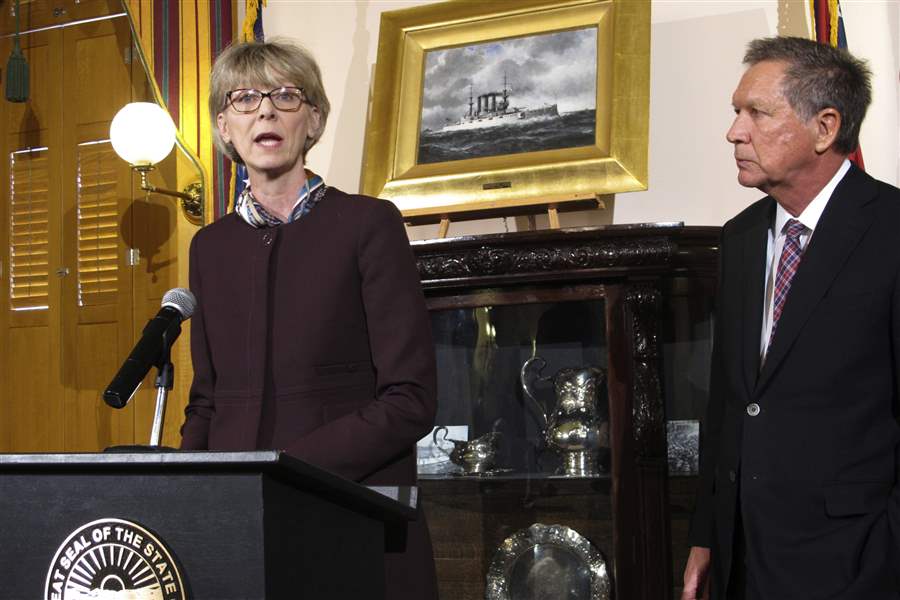
ELECTION 2018
Justice DeGenaro doesn't toe the party line
9/7/2018
Judge Mary DeGenaro accepts her appointment as a new Ohio Supreme Court justice, accompanied by Gov. John Kasich, on Jan. 25 in Columbus.
ASSOCIATED PRESS
COLUMBUS — When Ohio Supreme Court Justice Mary DeGenaro feels the need to clear her mind, she heads to her backyard to talk to “the girls.”
The Republican in recent years has taken up beekeeping and finds it relaxing to watch the bees tackle their roles as part of the hive
“The worker bees are all female ... and the queen runs the show,” the justice said. “All these colloquialisms about ‘busy bee,’ ‘beeline’ really have meaning. It’s so fascinating to watch them. ... I think the concept of the ‘queen bee’ in our common verbiage gets a little bit of a bad rap.”
Justice DeGenaro, of the Youngstown area village of Poland, spent 17 years on the eastern Ohio Seventh District Court of Appeals before being appointed in early January by Gov. John Kasich to the high court bench.
RELATED: Stewart argues diversity crucial for Supreme Court
On Nov. 6, she will try to hold on to the seat for a six-year term of her own opposite Democratic Cleveland appellate Judge Melody J. Stewart. Both candidates have been “highly recommended” by the Ohio State Bar Association.
Then-Judge DeGenaro served 14 years as the sole Republican on the Seventh District bench. She said calls for a Democratic voice on what is now an all-Republican Supreme Court are misguided.
“I can assure you I did not spend my entire career writing a dissent in every case,” she said. “I can assure you that when my three Democratic colleagues were on a panel together, they were not unanimous. ... If you look at my elective record and my writing record, I defy pigeon-holing because I have enjoyed broad bipartisan support over my elective judicial career — strong labor support.”
Judicial candidates in Ohio run in partisan primaries but without party labels in the general election.
Justice DeGenaro noted her first opinion as a justice was a dissent, on a case in which the majority found that a social worker who questioned a criminal defendant was not required to first advise him of his Miranda rights.
“Based on the facts in that case, she was acting as an agent of the police,” Justice DeGenaro said. “He had invoked his Miranda rights when he was questioned by police two times prior. If you buy into this narrative of Republican judges vote one way and Democratic judges vote another way, that should have been a unanimous decision.”
She also pointed to a case on the Seventh District in which she bucked the majority to argue that a 15-year-old, convicted of abducting and raping a college student, had been given multiple sentences that were tantamount to an unconstitutional life sentence
This was in light of a U.S. Supreme Court ruling that juveniles could not be sentenced to life in prison without possibility of parole. The Ohio Supreme Court later agreed he had to be resentenced.
“I acknowledged in my dissent that these crimes were horrible,” Justice DeGenaro said. “Should he be punished? Absolutely. But I took an oath to uphold the constitution, and whatever punishment is meted out, it must be constitutional.”
Justice DeGenaro served three years on Poland Village Council before she was elected to the appellate bench.
She was appointed to replace former Justice William O’Neill, then the court’s sole Democrat, when he resigned to run unsuccessfully for his party’s nomination for governor. Justice O’Neill had refused to vote to set dates for executions, arguing Ohio’s death penalty is unconstitutional.
In her short time on the bench, Justice DeGenaro has voted to set dates.
“At the end of the day, we took an oath to uphold the law and the constitution,” she said.
Contact Jim Provance at jprovance@theblade.com or 614-221-0496.